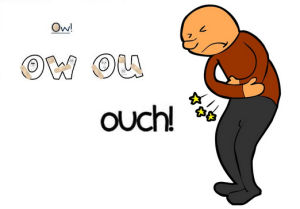Saying “ouch” is something we never think about. The response is automatic and it occurs daily, but we have no idea why that is. So, I did some research in order to figure it out, and now I would like to share my findings with all of you.
According to researchers at the National University of Singapore, “vocalizing may interfere with pain signals traveling to the brain, distracting you from the uncomfortable sensations you are feeling.”
However here is my null and alternative hypothesis:
Null Hypothesis- Saying “ouch” does not interfere with pain signals traveling to the brain or distract you from the uncomfortable sensations you are feeling.
Alternative hypothesis-Saying “ouch does interfere with pain signals and does distract you from the uncomfortable sensations you are feeling.
Moreover, the scientists from the National University of Singapore conducted an experiment to see whether or not they would receive correlations consistent with their hypothesis. Their experiment consisted of 56 participants who were asked to stick their hand into “painfully cold” water, all the while, they were told to say “ouch,” listen to a recording of another person saying “ouch,” to press a button, or to say nothing at all. At the end of the experiment the researchers found that the participants who said “ouch,” and the participants that were told to press the button were able to “withstand” the painfully cold water for seven seconds longer than those participants who did not. In fact, the subjects that said “ouch” and pressed the button tolerated the pain for an average of 30 seconds compared to the average of those who did not being 23 seconds. In the end, the researchers concluded that, “the muscle movement to required to cry out loud (or to push a button) may disrupt pain messages as they travel from the area affected to the brain.”
A psychology journal by the name of, Neuroreport, conducted a similar experiment to that of the one done by the researchers at the National University of Singapore. The only difference was that Neuroreport used 67 college students and broke the experiment up into two trials. The first trial the 67 college students had to stick their hand in painfully cold water and say nothing at all. During the second trial the participants stuck their hand in painfully cold water and were allowed to say “ouch” or swear. By the end of Neurreport’s experiment, their subjects reported that they were able to last, on average, 40 seconds longer with their hand submerged in painfully cold water. Not to mention that they also reported less pain when they were able to say “ouch” or swear during the second trial.
The researchers in these two experiments all ended up receiving strong correlations consistent with their hypothesis. As a result, I am able to reject my null hypothesis. However, even though the correlations are strong I cannot fully accept my alternative hypothesis, especially because the experiments conducted were not double-blind. Due to this fact, participants could have undergone a placebo affect. They thought they were supposed to have a longer pain tolerance while saying ouch, pressing a button, or swearing, so they did. Also, the experiments conducted are open to chance and third variables.
I don’t know about you guys, but I find this topic very interesting, and would love to see more data that supports my alternative hypothesis and the hypotheses of the researchers that conducted the experiments that I talked about. I read somewhere that how you express pain can be influenced by culture and language. Clearly, the reasonings as to why we say “ouch” are endless. If I find anymore probable causes I will happily share my findings. Thanks for reading guys!
Websites Used
http://www.huffingtonpost.com/2015/02/03/why-you-say-ouch-pain_n_6594170.html
http://img.techentice.com/img/Pain_Swallower.png


I enjoyed this blog post for several reasons. I thought it was unique how you came up with your own null and alternative hypothesis. Why we express our feelings of pain with verbal responses is something I have previously never thought much about. My initial guess as to why this happens would have to be from evolution. Our ancestors didn’t have a specific language like English so to express feelings and words they just had to use sounds. When an ancestor would feel pain they would express it with a verbal reaction which I would think would be passed down through generations. It’s something honed into our genes that has been passed down to us through trials and tribulations. I enjoyed reading your research it was truly an excellent post.
This is something I have always thought about but never really researched. Your idea that saying ouch makes us feel less pain or such is basically just what I thought saying ouch would do and mean. The reason i thought this though was because we can distract ourselves from pain as this study showed http://journals.lww.com/mcnjournal/Abstract/2001/03000/Taking_the__Ouch__Out_of_Injections_for_Children_.5.aspx though things like touch or photos or anything like that. So, in my mind this all just made sense to me. Your studies do show evidence but yes some more investigation is needed. Either way I love this idea at the very least.
This blog post immediately caught my eye; it’s a topic i’ve never even thought about. Kudos to you for thinking of such an original topic. I also like how you created your own null hypothesis and alternative hypothesis. You kind of created your own mini meta analysis by combining the findings of these studies. If I had to assume that one of your hypothesis was correct, I would also go with your alternative hypothesis. It would make sense that there is some sort of scientific reasoning behind why we have such an automatic verbal response to pain.